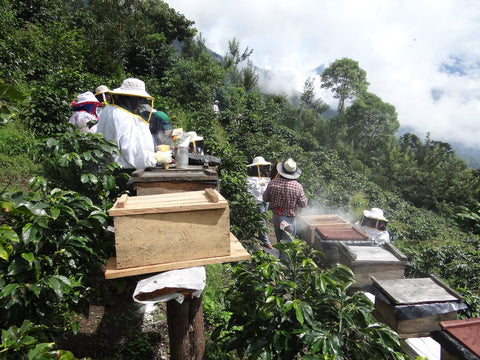First Published - August 24, 2012
At Union we have developed close relationships with both co-operatives and individual producers over many years. As we have close ties with farms in so many countries, we can help to pass on techniques and up to date advice, particularly in areas where industry education is sporadic and there is poor access to resources. Pascale also visited farms in Guatemala with ANACAFE, who work with local farmers both on site and through large scale events.
We visited six parcels in Huica, a village located in the mountains of Huehuetanango and around a 45 minute drive from La Libertad.. It is a small village and not all houses and parcels are accessible by car. This year there are several new female members from this village, many of whom are widows or divorced so now they have to take care of their parcels alone.
We visited these parcels with staff from ANACAFE (the national coffee association in Guatemala) that monitors coffee producers and gives technical advice across all coffee-producing regions of Guatemala. Their engineer came to advise how to tackle problems. Although producers are very experienced in producing coffee, in many cases they do things because that’s how their parents or neighbors do so, and this is not always the most efficient way.
Up to date advice from agronomists and engineers is very much appreciated by the producers. For me it is also interesting to participate in these kind of events, I am a development/agricultural economist with modest but rapidly increasing knowledge of crop cultivation. A day in the field like this helps me a lot in expanding my knowledge.
It’s also important for producers to share knowledge with each other. As well as the growing and care of the plants, they need to understand how to properly commercialise their crops, what’s involved in international export and crucially, how to raise the crop’s quality to the highest levels possible.
We also visited a group of 55 producers located in San Miguel Ixcahuacan, San Marcos Guatemala. The cooperative started this project because they hope that other producers can benefit from their experience with the high quality coffee market. These San Miguel Ixcahuacan producers approached the cooperative with for help in independently exporting their coffee.
Transmission of knowledge is not always easy. These producers rarely have access to the internet or suitable reference books. For advice they depend on ANACAFE’s agronomist (the national coffee institute) but thave insufficient staff to visit all groups on a regular basis. Learning from the experiences of neighbours and fellow producers is therefore a convenient way of transferring knowledge.
Cooperativa Esquipulas R.L. originally started as a cooperative that focussed on credit and savings. Coffee is one of the principal income sources in the area so they have incorporated a dedicated team devoted to exporting high quality delicious Huehuetenango Highland Coffee that for Union they have named “Liberacion” …
During the harvest four or five people work exclusively in coffee administration. They are in charge of finding lines of credit to pre-finance the harvest, making payments to the producers, weighing and collecting the coffee, storing the beans, cupping and all administration etc.
The cooperative was established in 1964, and received legal status in 1979. Their mission is to contribute to the quality of the lives of their members in a positive way by providing services such as credits, saving account, health and sustainable projects.
Its health service is free for their members. A doctor visits the cooperative every Saturday and there is a pharmacy that offers medicine at fair prices.
Co-operatives perform a vital service for their members and also offer support to each producer to make sure that everyone in the collective can be successful, get the best price for their crops, and secure their future in the coffee industry.






